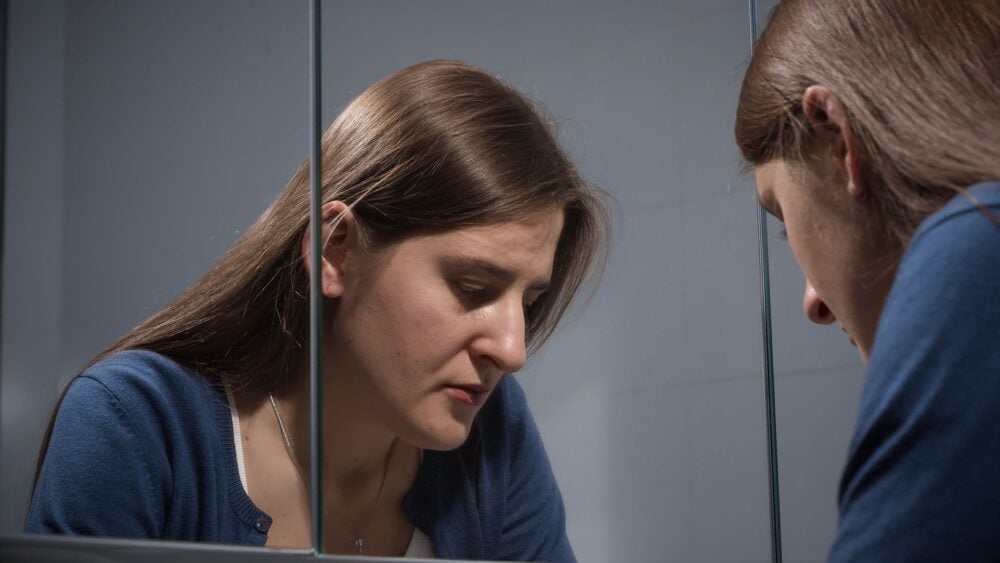You’re not broken—you’re just ignoring what your mind is begging you to face.

You’ve got the job, the house, maybe even the relationship—and yet, something feels hollow. You go through your day checking all the boxes, smiling when you’re supposed to, doing everything “right.” But deep down, there’s this quiet ache that won’t shut up. It’s not sadness, exactly. It’s not even boredom. It’s just this weird, lingering emptiness that clings to you no matter how many achievements you rack up or how much you try to stay busy. People might envy your life, and from the outside, it probably looks amazing. But on the inside? It’s like you’re living in grayscale while everyone else gets full color.
You’ve probably asked yourself what’s wrong with you—or tried to shake the feeling by planning your next big move. A vacation. A promotion. A new habit. But the emptiness doesn’t care. It just sits there, waiting, making you question everything. And that’s what messes with your head the most. You thought reaching a certain level in life would feel different. More fulfilling. But now you’re realizing something deeper is going on—and it’s not going away until you finally face it.
1. You’ve been chasing goals that never really mattered to you.

Sometimes you get so caught up in what you’re “supposed” to want that you stop questioning if it actually fits you. You aim for the promotion, the car, the big house—because that’s what everyone says equals success. And sure, hitting those milestones might feel good for a second. But then comes the weird silence after the celebration, where the sparkle fades and you’re left wondering, “Why don’t I feel more satisfied?” That’s the trap of chasing goals handed to you by someone else’s expectations—parents, peers, social media, you name it, according to Karen Cilli at Verywellmind.
If you never took the time to figure out what you really want, then no amount of external achievement will fill that internal gap. It’s like climbing a ladder only to realize it’s leaning against the wrong wall. That emptiness? It’s your gut telling you that something about your path feels off. You can ignore it, sure, but it’ll keep tugging at you. Because deep down, you know a meaningful life doesn’t come from checking off boxes—it comes from living with intention that actually feels like yours.
2. You’ve lost touch with who you are outside of your roles.

You might be the dependable partner, the dedicated employee, the go-to friend—but who are you when no one else is looking? It’s easy to get so wrapped up in being what everyone else needs that you forget how to just be… you, as reported by Sian Ferguson at Psych Central. When your identity is built entirely around the roles you play, life can feel oddly vacant once the spotlight dims. Maybe the kids grow up. Maybe the job plateaus. Or maybe you just have a rare quiet moment, and instead of feeling peace, you feel like a stranger to yourself.
That’s a sign that your sense of self has been outsourced. If you never feed your own soul—your hobbies, your quirks, your inner voice—it slowly fades into the background noise of daily demands. The emptiness creeps in when you realize you’ve been performing life rather than living it. Getting back to you isn’t selfish. It’s survival. And no, it’s not always easy. But ignoring that void only makes it louder. The real work? Remembering what lights you up—without needing anyone else’s permission.
3. You’re emotionally disconnected—even from yourself.

You might not even notice it at first, because you’ve learned to operate on autopilot. Get up, go to work, keep things moving. But underneath that steady rhythm, your emotions are collecting dust, as stated by Grace Garoutte-Mohammed at Betterup. You’ve gotten so good at keeping things “under control” that now you’re numb. You don’t let yourself feel too sad, too angry, or even too joyful—because somewhere along the way, you decided feelings were messy or inconvenient. So now you sit in this neutral zone, where everything is fine but nothing really touches you. That’s where the emptiness sneaks in. It’s not just about pushing people away—it’s about pushing yourself away.
You’ve forgotten how to check in, how to feel deeply, how to let your emotions guide you without drowning in them. And it shows up as this quiet void, like something important is missing but you can’t name it. The truth? You’re not broken—you’re just out of practice. Reconnecting with your emotions might feel awkward at first, but it’s the only way to feel fully alive again. Numbness isn’t peace—it’s a warning.
4. You’ve buried unresolved pain that’s quietly festering.

You’ve told yourself it’s in the past. You’ve “moved on.” But your body hasn’t. Neither has your subconscious. That heartbreak, that betrayal, that grief you never fully processed? It doesn’t disappear—it just goes underground. And when emotional wounds get buried instead of healed, they don’t vanish. They smolder. Over time, they show up as anxiety, burnout, or that mysterious emptiness you can’t explain. You might have thrown yourself into productivity, perfectionism, or caretaking, hoping it would drown out the ache. But no amount of busy-ness can mute what’s unresolved. It’s like trying to patch a foundation without addressing the cracks.
Eventually, the cracks win. Feeling empty might be your brain’s way of saying, “We still need to deal with this.” You don’t have to relive the pain, but you do need to face it with honesty and compassion. Because unacknowledged wounds don’t just hurt—they steal your peace. Healing doesn’t mean forgetting what happened. It means giving yourself permission to feel it, release it, and finally make room for something better.
5. You’re surrounded by people—but still feel completely alone.

You can be in a crowded room and still feel like no one sees you. That’s the kind of loneliness that doesn’t get solved by small talk or scrolling through your feed. It’s the ache that comes from being misunderstood, or worse—never really known. Maybe you’ve curated the “perfect” version of yourself that you show to the world, but inside, you’re starving for real connection. The kind where you don’t have to explain your thoughts three times or filter your feelings for the sake of keeping the peace. We’re wired for belonging, not just being near people.
And when your relationships lack depth, trust, or emotional safety, it chips away at your spirit. It’s exhausting to keep pretending everything’s fine when you feel so isolated. That emptiness isn’t about needing more friends—it’s about needing more truth in your relationships. Finding that starts with getting honest with yourself. Who makes you feel safe? Who drains you? Who really knows you? Until those answers feel solid, that loneliness won’t let go.
6. You’re living in survival mode and calling it normal.

When life constantly feels like a sprint, it’s easy to stop noticing how drained you are. You wake up already tense, power through your to-do list, collapse at the end of the day, and repeat. But this hustle isn’t strength—it’s survival. And survival mode has a sneaky way of numbing out everything that makes life feel meaningful. Joy? Pushed aside. Reflection? No time. Rest? Optional, if ever. You may be productive, even “successful,” but your nervous system is fried and your heart feels strangely hollow. That emptiness grows when your energy is spent on staying afloat instead of actually living. Maybe you haven’t had space to ask what you want, or even how you feel. It’s all been about keeping up, staying safe, and avoiding collapse.
But humans weren’t built to live in a constant state of fight-or-flight. You need breathing room. Stillness. A sense of safety that isn’t tied to checking off the next box. Survival mode might have gotten you through hard seasons—but if you’re still stuck there, it’s time to choose something more sustainable.
7. You’ve attached your worth to achievements—and now they feel empty.

You’ve hit your goals, checked the boxes, maybe even surpassed expectations. So why does your self-worth still feel like it’s on life support? Because when your value is tied entirely to what you do, you’re never allowed to just be. You’re only as good as your last win. That’s a brutal place to live—constantly striving, constantly proving, never quite feeling “enough.” Eventually, the achievements lose their spark. You get the raise, the recognition, the win… and then what? A hollow victory. That inner critic keeps shifting the finish line, whispering that you should be doing more.
And the scariest part? You start wondering who you are without the hustle. That’s the real emptiness—realizing you’ve built a sense of self on a moving target. Reclaiming your worth means detaching it from outcomes. You’re valuable even when you’re not producing. Even when you rest. Even when you fall short. It’s not about quitting your dreams—it’s about not letting them define your humanity. You’re already enough. Everything else is just extra.
8. You’re trying to outrun your own thoughts.

Some days, silence feels like the enemy. So you fill your schedule, scroll endlessly, binge-watch, or work late—anything to avoid being alone with your mind. But the more you run from your thoughts, the more control they have. That quiet ache you feel when things slow down? That’s not boredom. It’s your mind begging you to face what you’ve been avoiding. It could be fear, grief, regret, or even just the uncomfortable truth that something in your life isn’t working anymore. But instead of sitting with it, you keep moving. You distract yourself into exhaustion. And that distraction is a short-term solution that fuels long-term emptiness. You can’t grow while you’re constantly fleeing your own reflection.
Facing your thoughts isn’t about wallowing—it’s about finally getting honest. What are you afraid of knowing? What are you afraid of feeling? The truth might sting, but it’s also the only thing that sets you free. You don’t have to have all the answers. You just have to stop running and start listening—even when it’s uncomfortable.
9. You’ve cut yourself off from spiritual or existential meaning.

You might not consider yourself religious—or maybe you walked away from all that years ago. But every human, in one way or another, is wired to ask bigger questions: Why am I here? What really matters? What connects me to something beyond just the daily grind? When you ignore those questions for too long, life can start to feel oddly flat. You go through the motions, succeed at the game, but something feels profoundly unanchored. That’s where the spiritual void creeps in—not necessarily a lack of religion, but a lack of meaning.
Maybe you’ve been too busy, too skeptical, or too burned by past beliefs to go there again. But a sense of purpose doesn’t require a specific label. It just requires connection—to nature, to values, to creativity, to a belief in something bigger than just surviving another Monday. When that connection’s gone, even the best parts of life start to feel like hollow shells. Meaning doesn’t show up by accident. You have to seek it, shape it, and stay open to rediscovering it on your terms.
10. You’ve stopped dreaming because it feels safer not to hope.

There was probably a time when you had big plans, even wild ones. But maybe life knocked you around a bit. Maybe you took a risk and it backfired. Or maybe you watched someone else crash and burn, and you decided you’d rather play it safe. Now you’re careful—not necessarily content, just cautious. You aim low, keep expectations manageable, and tell yourself you’re being realistic.
But underneath that “practical” mindset is a quiet kind of heartbreak: you’ve stopped letting yourself dream. And without dreams, life becomes a series of routines rather than an unfolding adventure. That emptiness you feel? It might be the gap between where you are and the part of you that still wants more—but doesn’t quite trust it’s possible. Hope feels risky. But so does living a life where nothing excites you anymore. Dreaming again doesn’t mean being reckless. It means giving yourself permission to believe in possibility—even if it feels fragile. Even if it scares you. Because shutting down hope to avoid disappointment only guarantees one thing: numbness.
11. You’re stuck in the past and can’t move forward.

You might not talk about it much, but part of you is still anchored to something behind you. A regret. A missed chance. A version of yourself you can’t seem to forgive. You’ve tried to move on, sure—but it’s like dragging a suitcase full of “what ifs” everywhere you go. And it weighs you down in ways you don’t always notice until the quiet moments creep in. That sense of emptiness might be your future calling out—but the past has your phone on silent. It’s easy to confuse reflection with rumination. Reflection helps you learn. Rumination just keeps you stuck. You deserve to evolve. You deserve to let go, even if you never get the apology, the closure, the redo.
Moving forward doesn’t mean pretending the past didn’t happen. It means refusing to let it define who you are now. You can carry the lesson without living in the loop. The moment you start making peace with yesterday, space opens up for something new to take root.
12. You’ve convinced yourself you’re fine—so you never ask for help.

You tell yourself it’s not that bad. Other people have it worse. You’ve got food, a job, maybe even some good days—so you grit your teeth and push through. But deep down, you know something’s off. You feel hollow more often than not, but admitting that out loud? Feels like failure. So you fake it. You smile. You power through. And no one knows how heavy it’s gotten because you’ve become so damn good at pretending. But pretending is lonely. It keeps people at arm’s length. And it keeps you from the relief you actually need.
Asking for help doesn’t make you weak—it makes you human. A therapist, a trusted friend, a support group—it doesn’t matter where you start. What matters is deciding you’re worth the effort. Because you are. No one gets through this life untouched by struggle. And trying to muscle your way through emptiness in isolation only deepens the hole. You don’t have to be falling apart to deserve support. Sometimes just saying “I’m not okay” is the bravest—and most healing—thing you’ll ever do.